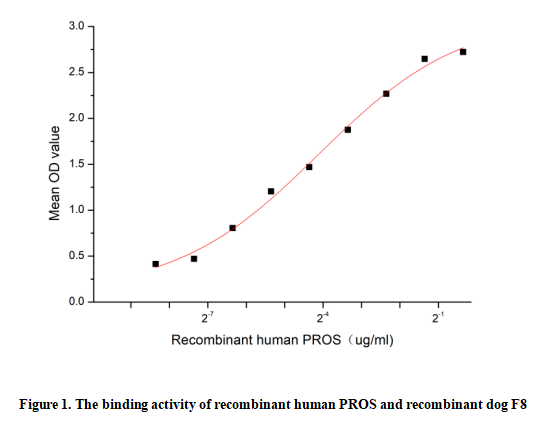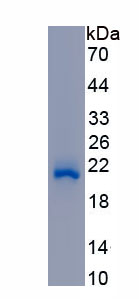Active Protein S (PROS) 

PSA; PS; PS26; PS21; PS22; PS23; PS24; PS25; VKDPS; VKDP-S; Protein Sa; Vitamin K Dependent Protein S
Overview
Properties
- Product No.APB971Hu02
- Organism SpeciesHomo sapiens (Human) Same name, Different species.
- ApplicationsCell culture; Activity Assays.
Research use only - DownloadInstruction Manual
- CategoryMetabolic pathwayHematology
- Buffer FormulationPBS, pH7.4, containing 0.01% SKL, 5% Trehalose.
- Traits Freeze-dried powder, Purity > 90%
- Isoelectric Point5.5
Sign into your account
Share a new citation as an author
Upload your experimental result
Review

Contact us
Please fill in the blank.
Activity test

Protein S (PROS) is a vitamin K-dependent plasma protein functions as a cofactor for the anticoagulant protease, activated protein C (APC) to inhibit blood coagulation.It acts as a cofactor for activated protein C, which inactivates factors Va and VIIIa, thus reducing the risk of thrombosis.Coagulation factor VIII (F8) binds to protein S (PROS) to participate in the clotting process, regulating thrombin production and the conversion of fibrinogen to fibrin, thereby maintaining normal blood clotting function.Thus a functional ELISA assay was conducted to detect the interaction of recombinant human PROS and recombinant dog F8.Briefly, PROS was diluted serially in PBS with 0.01% BSA (pH 7.4). Duplicate samples of 100 μl were then transferred to F8-coated microtiter wells and incubated for 1h at 37℃. Wells were washed with PBST and incubated for 1h with anti-PROS pAb, then aspirated and washed 3 times. After incubation with HRP labelled secondary antibody for 1h at 37℃, wells were aspirated and washed 5 times. With the addition of substrate solution, wells were incubated 15-25 minutes at 37℃. Finally, add 50 µL stop solution to the wells and read at 450/630nm immediately. The binding activity of recombinant human PROS and recombinant dog F8 was shown in Figure 1, the EC50 for this effect is 0.058ug/mL.
Usage
Reconstitute in 10mM PBS (pH7.4) to a concentration of 0.1-1.0 mg/mL. Do not vortex.
Storage
Avoid repeated freeze/thaw cycles. Store at 2-8°C for one month. Aliquot and store at -80°C for 12 months.
Stability
The thermal stability is described by the loss rate. The loss rate was determined by accelerated thermal degradation test, that is, incubate the protein at 37°C for 48h, and no obvious degradation and precipitation were observed. The loss rate is less than 5% within the expiration date under appropriate storage condition.
Increment services
-
 BCA Protein Quantification Kit
BCA Protein Quantification Kit
-
 Molecular Mass Marker for Protein
Molecular Mass Marker for Protein
-
 Monoclonal Antibody Customized Service
Monoclonal Antibody Customized Service
-
 Polyclonal Antibody Customized Service
Polyclonal Antibody Customized Service
-
 Protein Activity Test Experiment Service
Protein Activity Test Experiment Service
-
 Electrophoretic Mobility Shift Assay (EMSA) Experiment Service
Electrophoretic Mobility Shift Assay (EMSA) Experiment Service
-
 Buffer
Buffer
-
 Lentivirus Packaging Experiment Service
Lentivirus Packaging Experiment Service
-
 Adenovirus Packaging Experiment Service
Adenovirus Packaging Experiment Service
-
 Real Time PCR Experimental Service
Real Time PCR Experimental Service
-
 Spike RBD Protein (S-RBD)
Spike RBD Protein (S-RBD)
-
 Protein G
Protein G
-
 Protein A
Protein A
Citations
- Validation in the ESPOIR cohort of vitamin K-dependent protein S (PROS) as a potential biomarker capable of predicting response to the methotrexate …Pubmed:35313956







